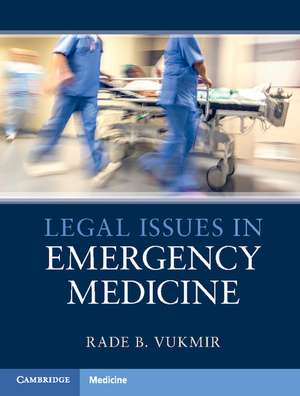Legal Issues in Emergency Medicine
Autor Rade B. Vukmiren Limba Engleză Hardback – 21 mar 2018
Preț: 428.86 lei
Preț vechi: 451.44 lei
-5% Nou
Puncte Express: 643
Preț estimativ în valută:
82.07€ • 87.75$ • 68.42£
82.07€ • 87.75$ • 68.42£
Carte indisponibilă temporar
Doresc să fiu notificat când acest titlu va fi disponibil:
Se trimite...
Preluare comenzi: 021 569.72.76
Specificații
ISBN-13: 9781107499379
ISBN-10: 1107499372
Pagini: 368
Dimensiuni: 195 x 254 x 25 mm
Greutate: 0.87 kg
Editura: Cambridge University Press
Colecția Cambridge University Press
Locul publicării:New York, United States
ISBN-10: 1107499372
Pagini: 368
Dimensiuni: 195 x 254 x 25 mm
Greutate: 0.87 kg
Editura: Cambridge University Press
Colecția Cambridge University Press
Locul publicării:New York, United States
Cuprins
1. Abandonment in the emergency department; 2. Abandonment of patient by treating physician; 3. Admission; 4. Advance directives; 5. Advanced practice providers; 6. Adverse event disclosure; 7. Against medical advice (AMA); 8. Americans with Disabilities Act (ADA) and education; 9. Americans with Disabilities Act (ADA) and access to facilities; 10. Assault; 11. Assisted suicide; 12. Battery; 13. Bed boarding; 14. Brain death; 15. Care of children; 16. Code response; 17. Commitment; 18. Communication; 19. Competence and capacity; 20. Confidentiality; 21. Consultation; 22. Controlled substances; 23. Criminal charges; 24. Criminal acts; 25. Death certification; 26. Decision-making; 27. Difficult patient encounter; 28. Discharge instructions; 29. Disruptive provider behavior; 30. Do Not Resuscitate (DNR); 31. Documentation; 32. Domestic violence; 33. Driving impairment; 34. Drug and alcohol abuse; 35. Duty to warn; 36. Electronic health records (EHR); 37. Emergency consent; 38. Emergency Medical Services (EMS); 39. Emergency Medical Treatment and Labor Act (EMTALA); 40. Employment issues; 41. Expert witness; 42. Fitness for duty; 43. Frequent user; 44. Futility; 45. Geriatric abuse; 46. Good Samaritan; 47. Guidelines and protocols; 48. Health Insurance Portability and Accountability Act (HIPAA) / Health Information Technology for Economic and Clinical Health Act (HITECH); 49. HIV; 50. Hospital medicine; 51. Immigrant care; 52. Impaired physician; 53. Indigent care; 54. Inflight emergencies; 55. Informal consultation; 56. Informed consent; 57. Insurance; 58. Intoxication; 59. Laboratory testing; 60. Left without being seen (LWBS) / left without treatment (LWOT) / elopment; 61. Malpractice claims; 62. Mandatory care; 63. Mandatory reporting; 64. Medical education; 65. Medical errors; 66. Medical records; 67. Medical Screening Exam (MSE); 68. Minor consent; 69. Missed illness and injury; 70. Multiple visits; 71. Nursing; 72. Operations; 73. Organ donation; 74. Overcrowding; 75. Pain control/medication; 76. Patient satisfaction; 77. Pediatric abuse; 78. Peer review; 79. Policy/procedure; 80. Pregnancy; 81. Prescription writing; 82. Privacy; 83. Professional boundary issues; 84. Protected health information (PHI); 85. Psychiatric care; 86. Referral; 87. Religion; 88. Research; 89. Restraint; 90. Resuscitation; 91. Service contract; 92. Sexual assault; 93. Social media; 94. Staff privileges; 95. Subpoena; 96. Substance abuse; 97. Suicide; 98. Telemedicine; 99. Telephone advice; 100. Third-party duty; 101. Transfer; 102. Translation, interpreting, and language issues; 103. Triage; 104. Unanticipated death; 105. Urgent care; 106. Violence; Glossary.
Notă biografică
Descriere
This book provides a clear pathway through the common yet complex legal dilemmas frequently encountered in emergency medical practice.
